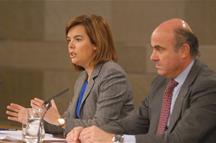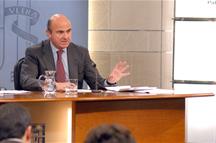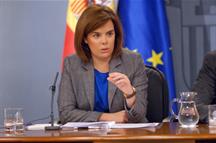Council of Ministers
Government approves urgent measures to protect most vulnerable mortgage debtors
Council of Ministers - 2012.11.15
Moncloa Palace, Madrid
The Council of Ministers approved a Royal Decree-Law on urgent measures to improve protection for mortgage debtors.
The Vice-President of the Government, Soraya Sáenz de Santamaría, explained that this measure forms part of an initial set of decisions taken by the government aimed at combating the most urgent situations.
According to the Vice-President of the Government, "we need to implement many economic reforms to return to growth but we are also aware that, in the meantime, social measures need to be taken to alleviate the difficult situation that certain families are going through".
The Royal Decree-Law provides for a two-year moratorium on evictions affecting the most vulnerable groups in society. The Minister for Economic Affairs and Competition, Luis de Guindos, said that this measure aims to "avoid people being turned out of their home".
Protected groups
 Pool Moncloa
Pool MoncloaLuis de Guindos explained that the measure will affect large families, single-parent families with two children, families with minors under the age of three and family units that include disabled persons, dependent persons or sick persons. It will also apply to families where the mortgage debtor is out of work and no longer entitled to unemployment benefits, as well as family units that include a victim of gender-based violence.
In addition to these requirements, the level of income received by the mortgage debtors may not exceed triple the Multiplier for the Public Income Index (Spanish acronym: IPREM), which in 2012 stands at 532 euros a month. The measure will also be applied to families that have suffered a significant alteration to their economic circumstances.
Both the Vice-President of the Government and the Minister for Economic Affairs and Competition announced that the government will start to negotiate the creation of a social housing fund, which is currently held by the banks, aimed at social rentals at very low prices for those who have lost their homes.
Soraya Sáenz de Santamaría trusts that the government will be able to count on the support of all parliamentary groups in the passage of the draft bill through Parliament. She also thanked the government's technical teams and the Socialist Party for their work, saying that they had worked "hard and very well" to ease the situation caused by recent evictions.
Asset Management Company
 Pool Moncloa
Pool MoncloaThe Council of Ministers approved a Royal Decree establishing the legal regime for asset management companies, within the framework of the agreements with European institutions for the recapitalisation of the Spanish banking system. This decision will result in the implementation of the Asset Management Company deriving from the Bank Restructuring (Spanish acronym: SAREB) on 1 December.
Soraya Sáenz de Santamaría confirmed that the company "will pool the toxic assets from entities undergoing restructuring processes in order to manage and sell them off in an orderly manner". The regulation will establish which assets are to be transferred, how they are valued and the legal structure of the company, always "from a perspective of maximum transparency, professionalism and subject to continuous evaluation".
In turn, Luis de Guindos highlighted that "the fundamental objective of the company is to facilitate the definitive clean-up of the entities, free up capital, implement professional management and boost the housing market".
The minister reported that a public limited company will be incorporated to own and manage the assets. The shareholders will comprise the Fund for Orderly Bank Restructuring (Spanish acronym: FROB), which may not exceed ownership of more than 50% of the capital, and other institutional investors.
Assets to be transferred
Luis de Guindos announced that the maximum total volume of assets has been set at 90 billion euros, although estimates put the actual figure at around 62 billion euros. This includes property loans in excess of 250,000 euros, real estate assets from foreclosures exceeding 100,000 euros and shareholdings in real estate companies. Property loans that do not exceed 250,000 euros and assets from foreclosures that do not exceed 100,000 euros are excluded.
The minister stated that the average price adjustment under which assets will be transferred from banks receiving aid to the asset management company stands at approximately 50%. This stands at 63% for assets from foreclosures and close to 46% for property loans.
The average forecast return set out in the business plan prepared for the SAREB stands at around 15% over 15 years.
Tax information obligations
 Pool Moncloa
Pool MoncloaThe government approved a Royal Decree that sets tax information obligations on assets and rights held overseas.
Soraya Sáenz de Santamaría said this is about adapting Spanish General Tax Law to Community and international law on matters of mutual assistance. "Taxpayers must declare any assets and rights they hold overseas during the first quarter of 2013, both accounts held with financial entities and real estate, securities, rights, insurance policies and revenue deposited overseas. Individual assets that do not exceed a value of 50,000 euros are excluded from this action".
It will also be obligatory to present an informative return during successive years when limits experience growth in excess of 20,000 euros.
Questions
 Pool Moncloa
Pool MoncloaAt the start of the press briefing, the Vice-President of the Government referred to the 22nd Ibero-American Summit being held in Cadiz (Spain) from Friday, as "a very important event at a time of great transformation in the region and in which we consider it very important, from a political, economic and social point of view to form closer ties with Ibero-America under a new formula of much more balanced integration".
In her opinion, it will be a highly important event "not only due to its high level of participation and the presence of many heads of state, but also because of the important subject-matter to be discussed within its framework". She reminded the press that, "200 years ago, Spanish constitutionalism was created in Cadiz, which was also a very important constitutional time for a good many of these countries, for the whole Latin American continent, and it is a good time to strengthen this framework of cohabitation and of mutual interrelations that we all have as Latin Americans".
On the subject of Wednesday's general strike, the Vice-President of the Government pointed out that the government defends the right of those who decided to go on strike, as well as of those who chose not to, and that "undoubtedly" the government listens to what is being said in the streets but must also be aware of "its ballot box mandate" and its duty to take measures that "are pending and very necessary" and work so that "this country can return to growth and job creation".
She also announced the figure of the number of rallies and demonstrations that took place on Wednesday as a result of the strike: 1,084, according to data from the Ministry of Home Affairs, and insisted that violence "cannot be condoned or justified", because "destruction is not the exercise of any specific right".
As regards the government's position on one-euro medical prescriptions, she reminded the press that a negotiation panel has been set up that will endeavour to appreciate the "need to modify the measure", particularly in light of the recent opinion handed down by the Council of State that considers the measure to be unconstitutional".





